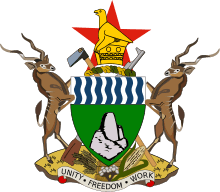Cabinet of Zimbabwe
 |
| This article is part of a series on the politics and government of Zimbabwe |
|
| See also |
|
|
|
Politics portal |
The Cabinet of Zimbabwe is an executive body of appointed government ministers. Until 1987, the Cabinet was chaired by the Prime Minister; it is now headed by the President.
Composition
It consists of two vice-presidents, the prime-minister, two deputy prime-ministers, appointed ministers of government, and provincial governors.
Relationship with Council of Ministers
According to the September 2008 deal that resulted out of political negotiations, the Cabinet will retain its structure, but the Council of Ministers of Zimbabwe will consist strictly of the 31 ministers who will serve as a liaison office; while the Cabinet will be chaired by the president, the council of ministers will be chaired by the restored office of prime minister.
References
| ||||||||||||||
| ||||||||||||||